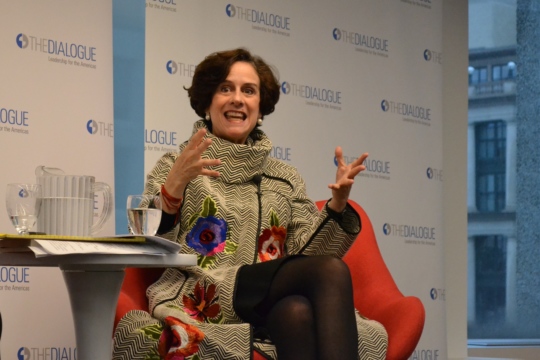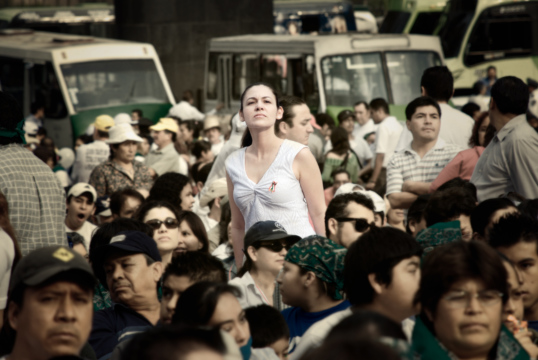A Conversation with Josefina Vázquez Mota
With primary elections approaching, the candidates vying for their parties’ nomination are making their agendas heard.
A Daily Publication of The Dialogue
Q: Mexico's opposition Institutional Revolutionary Party (PRI) on Nov. 13 won back the governorship of Michoacán state with the victory of Fausto Vallejo Figueroa over Luisa María Calderón, the candidate of the National Action Party (PAN) and sister of President Felipe Calderón. The result in Michoacán, the president's home state, was seen as a sign of weariness with the PAN amid the country's brutal drug war. Does the Michoacán election portend a return of the PRI to the presidency next year? How will economic conditions in Mexico, which is forecast to grow between 3.5 and 4 percent this year, affect the election? Is Mexico perceived as a good place to do business or has the drug war significantly affected investment?
A: Rogelio Ramírez de la O, president of Ecanal in Mexico City: "There is no doubt that the triumph of the PRI in the state election in Michoacán signals its pre-eminence in the forthcoming presidential election in July 2012. For the PAN, the loss is significant because its candidate was the sister of President Calderón, Luisa María. And for the PRD the loss was probably worse, as that party had the incumbent government and the state had been, up until now, a political bastion of the party. The causes of the loss are multiple and are still subject to interpretation, but it is clear enough that the combination of bad economic performance and violence proves to be lethal for any government. In the case of Michoacán, the protracted economic slowdown includes the fact that it is one of the largest destinations of workers' remittances, which fell significantly since 2008. It is also the state where drug cartels have not only been active in their traditional drug operations, but also in diversifying to other crimes, including kidnapping and extortion. Such results are foretelling that a weak economy and worsening security create an environment in which it would be extremely difficult if not impossible for the PAN to win the election in 2012. It is similarly difficult for the PRD, especially in states where its governments do not appear to bring innovation in the way in which they govern and are perceived to govern. In the presidential election, however, it will not be as easy for the PRI, as it will confront evidence of corruption in some of its governorships and will have great difficulty justifying its alliance with the teachers' union leader, Elba Esther Gordillo."
A: Andrés Rozental, member of the Advisor board and president of Rozental & Asociados in Mexico City and senior fellow at the Brookings Institution: "The PRI's victory in Michoacán was a serious blow to the PAN, as well as to President Felipe Calderón personally, in addition to being a stinging defeat for the PRD, which has governed the state for the last 10 years. Although Fausto Vallejo and the PRI ran an aggressive campaign to wrest control of Michoacán from the PRD, many observers felt that the combined strength of Calderón's sister, the fact that Michoacán is the president's home state and the large amounts of money and resources pumped into the local contest, might have made the difference and allowed María Luisa 'Cocoa' Calderón to eke out a victory. The surprise in the election was the PRD's fairly strong showing, notwithstanding the general unpopularity of the outgoing governor and the fact that 54 percent of the electorate voted in a state that is reputed to be one of the most violent and dangerous. As for the 2012 presidential election, the PRI continues to be way out in front of the other major parties, having just registered a coalition with the green party (PVEM) and Elba Esther Gordillo's Panal. Although there are still two pre-candidates from the PRI (Enrique Peña Nieto and Manlio Fabio Beltrones), it appears quite likely that Beltrones will drop out sometime soon and leave the field open to Peña Nieto. Having won Michoacán certainly helps the PRI, but it probably won't make that much of a difference in the presidential race. Mexico's economy is beginning to show signs of a major slowdown and growth figures for this and next year have recently been revised downward several times. The economy, jobs and public security will be the main issues on which Mexicans will go to the polls next July 1 and once the formal campaigns begin and the three candidates are selected by their respective parties, they will have to focus on those problems in trying to convince voters to support them."
A: George W. Grayson, professor of government at the College of William & Mary: "PRI activists are cheering both the return of Monarch butterflies and the Nov. 13 gubernatorial win in Michoacán. Their candidate, Fausto Vallejo, defeated the chief executive's sister, Luisa María 'Cocoa' Calderón, and Silvano Aureoles. This contest yields clues about the July 1, 2012 presidential showdown: (1) although Mexican voters have little influence over incumbents, they can penalize the dauphins of outgoing office holders-in this case PRD Gov. Leonel Godoy, associated with ubiquitous violence and allegedly with the Knights Templar drug cartel; (2) citizens are eager for change; (3) PRD legislative candidates ran ahead of Aureoles suggesting defections to the PRI, which are likely to occur next year; (4) the risk-averseness of Enrique Peña Nieto, who made three appearances with Vallejo, but did not pull out stops lest the former Morelia mayor lose and toss a pebble in the path of his juggernaut to occupy Los Pinos; (5) Elba Esther Gordillo's pragmatism: her PANAL party formally endorsed the PAN's Calderón, but 'La Maestra,' who joined a pro-Peña Nieto alliance earlier this month, did not break a sweat on behalf of Cocoa; and (6) a post-electoral conflict over a narrow PRI victory in the state capital Morelia portends a similar brouhaha if the left's Andrés Manuel López Obrador burns and crashes in the presidential vote. The mid-November victory extended Humberto Moreira's hold on the presidency of the PRI, but his grip is tenuous because financial skullduggery in Coahuila has embarrassed Peña Nieto. The Economy Ministry reported that $10.6 billion in FDI entered Mexico during the first half of the year, down 13.3 percent from the same period in 2010. Investors, who are waiting for the smoke to clear in Washington and Europe, award high marks to MIT-trained Luis Videgaray Caso, the odds-on favorite to lead the economic team of a PRI government."
With primary elections approaching, the candidates vying for their parties’ nomination are making their agendas heard.
On Thursday, May 11th, the Inter-American Dialogue hosted an event with Denise Dresser, professor of Political Science from the Instituto Tecnológico Autónomo de México. During the event: What’s Wrong with Mexico & How to Fix It, Dresser addressed the challenges the country is facing today such as the US-Mexico relations, Enrique Peña Nieto’s presidency, and corruption.
Next year, critical elections in Latin America’s three most populous countries—Colombia, Mexico and Brazil—are likely to reveal a distemper stemming from citizen disgust with a mix of corruption scandals, mediocre economies, unremitting violence and a largely discredited political class. All three presidential contests are wide open and ripe for anti-establishment challengers.
 Video
Video
